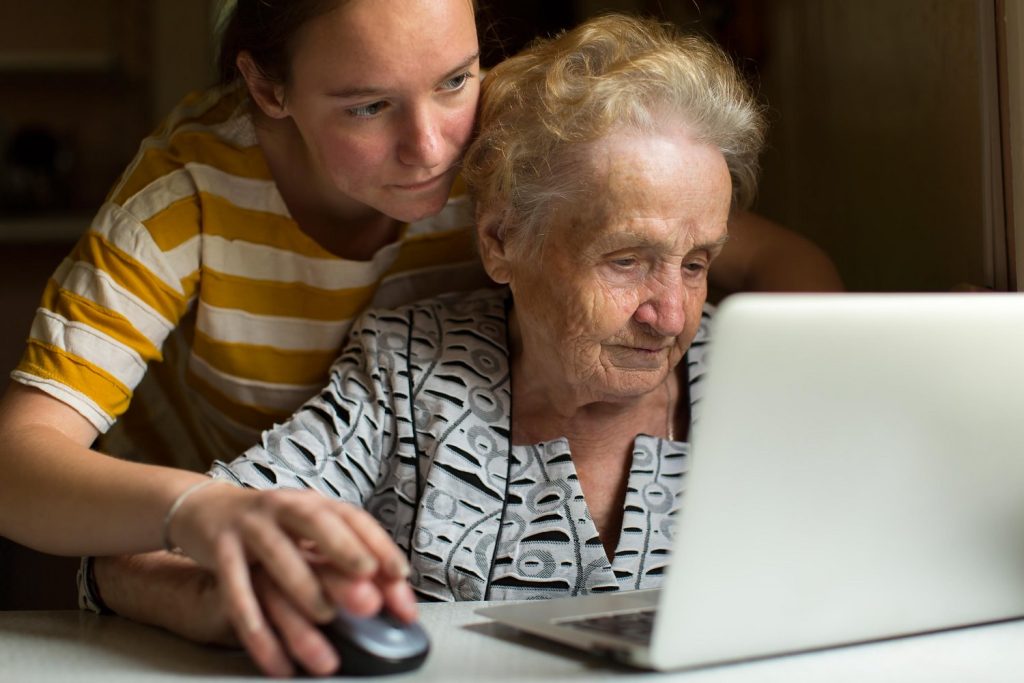Governments are digitalising fast, but not everyone is online. A recent study indicates that only 28,4% of Portuguese citizens between the age of 65 and 74 know how to use a computer. Age, often coupled with gender, is a discriminating factor for access to technologies. Elderly people are often excluded from online participation. International institutions and governments are aware of this problem and are acting on it. One example is the Portuguese city of Cascais.
An intergenerational volunteering project
During the Covid-19 pandemic, the Municipality of Cascais realized that its elderly people were suffering the most from social isolation. Disconnected from loved ones and from their social fabric, they could not be fully involved citizens. This became evident thanks to a study made by the Participatory Budgeting (PB) team of Cascais who found out that the older section of the population had a very low voter turnout. The reason was apparent: they did not know how to vote online.
To combat both loneliness and digital illiteracy the Municipality of Cascais launched an intergenerational volunteering project called “Youth involvement in educating the senior population in new communication technologies and the internet”. Young volunteers hosted workshops where they taught the elderly the basics of the use of technology – for instance: how to surf the internet and use applications like WhatsApp, and Zoom, or how to send an email.
Digital participation: age does not have to be a barrier
But they did not stop there. The project stretched for several months which gave the organizing team the opportunity to extend the scope to teaching elderly people digital participation. The city of Cascais has a platform called “Viver Cascais” where citizens can set up a private account – MyCascais – and access a variety of functions. Marta Osório, project manager, explained to us the importance of this platform “having an account is not only essential for things like free transportation and getting the vaccine certificate – when it was needed – but it is also important for voting in the Cascais PB project”.
The volunteers, then, taught the elderly how to create a myCascais account, they talked about privacy and security online and how to vote online. At the end of the first edition, participants were asked to fill in a survey and the overwhelming response was that this experience not only helped them feel less lonely but it also improved the communication with the institutions.
The project has now entered its third edition. Young volunteers are enthusiastic about it, as Osório explains “our volunteers just love to participate and have already asked to join the next edition which will start in September”. Elderly participants also share the enthusiasm as the outcome of the first impact report outlines: 92% would recommend the project to family and friends and they stated that the project was very important for them.
The Municipality of Cascais is not alone in the effort to make digital citizenship accessible to all. On 6 July of this year, the Portuguese government has launched the project “Eu Sou Digital” (I am digital) which aims at promoting digital literacy for 1 million adults in Portugal. Osório explains that there are still a lot of people in Portugal who do not use a computer or internet regularly, hence they do not know how to participate in digital citizenship.
Since the project is new, we are yet to see what the impact of Eu Sou Digital will be. However, Cascais’ example shines a hopeful light. Age does not have to be a discriminating factor. On the contrary, this project’s result show that people, regardless of age, want to participate. They just need to be put in the conditions to do so. The alliance between older and new generations, with institutional support, proves that an inclusive digital citizenship is possible.
